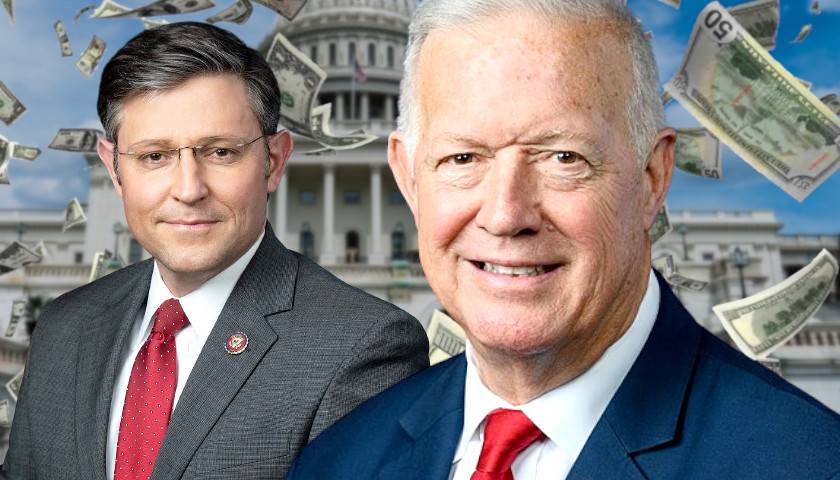by Nicholas Ballasy
Members of the conservative House Freedom Caucus sponsored more than $900 million worth of earmarks over the last two years, according to a study conducted by OpenTheBooks.com and published on Thursday.
While the Freedom Caucus does not publicly list all of its members, OpenTheBooks said they based their study off of a list of 49 lawmakers that Pew compiled, which includes lawmakers who publicly identified as members of the caucus or are “closely aligned” with it.
The group’s study included data from spending bills that were passed by Congress after January 2023 and signed into law by President Biden.
The earmarks total for 2023 from 8 Freedom Caucus members was $447.8 million. The average spent was $56 million, according to the results of the study.
The earmarks total for 2024 from 22 Freedom Caucus members was $508 million and an average of $23.1 million. The total resulting from the study over both years was $957 million.
Just the News removed from the OpenTheBooks.com total the $50 million in earmarks that Rep. Matt Gaetz, R-Fla., secured since he indicated last year he was not a member of the Freedom Caucus.
According to the findings, the amount of the Freedom Caucus earmarks are more than the OpenTheBooks.com study that showed progressive members of the so-called Squad had sponsored $220 million of earmarks over the same period of time.
Earmarks are formally referred to as Community Project Funding in the House and Congressionally Directed Spending Requests in the Senate. Earmarks were banned temporarily in Congress starting in 2011 but the ban was lifted by both Republicans and Democrats starting in 2021.
Adam Andrzejewski, the CEO of OpenTheBooks.com, said in a statement that the “currency of corruption” is being “abused by both parties” in the U.S. Congress.
“Their spending priorities may look dramatically different, but these findings illustrate one of Congress’ worst-kept secrets. When it comes to burning through our tax dollars, there’s effectively one party in Washington, and it’s addicted to spending your money,” he said.
“While earmarking nearly $1 billion, these Freedom Caucus members have effectively stood shoulder-to-shoulder with members of the Squad. By playing the earmark game, they make it excusable for others, too,” he added.
Rep. Randy Weber, R-Texas, who was removed from the caucus in March, was the top earmark sponsor at $431.9 million since the start of 2023. Weber’s removal was reportedly due to missing several of the group’s meetings. In second place is current House Speaker Mike Johnson, R-La., with $70 million over the two year period. In third place is Rep. Clay Higgins, R-La., with $67.6 million.
The remaining 17 members that OpenTheBooks.com found sponsored earmarks since 2023 include GOP Reps. Lauren Boebert of Colorado, Ben Cline of Virginia, Mike Collins of Georgia, Scott DesJarlais of Tennessee, Byron Donalds of Florida, Morgan Griffith of Virginia, Harriet Hageman of Wyoming, Andy Harris of Maryland, Diana Harshbarger of Tennessee, Ronny Jackson of Texas, Anna Paulina Luna of Florida, Max Miller of Ohio, Greg Murphy of North Carolina, Troy Nehls of Texas, Bill Posey of Florida, Keith Self of Texas and Greg Steube of Florida.
Rep. Marjorie Taylor Greene, R-Ga., left the Freedom Caucus in July 2023. OpenTheBooks.com included her $9.3 billion in earmarks in their total since it covered any member of the Freedom Caucus starting in January 2023.
GOP lawmakers such as Rep. Bob Good, R-Va., the current chairman of the House Freedom Caucus, have criticized the use of earmarks in Congress as wasteful spending. Other Republicans have defended the use of earmarks, arguing that they are used as a way to direct federal agencies to spend taxpayers’ dollars on specific projects.
“Keep in mind as representatives we are the closest thing to the people,” Rep. Burgess Owens, R-Utah, said during an interview on Capitol Hill in March. “If there’s a body that knows what the people really care for and need it is the House.”
– – –
Nicholas Ballasy has been breaking news for more than a decade in the nation’s capital and questioning political leaders about the most pressing issues facing the nation.




